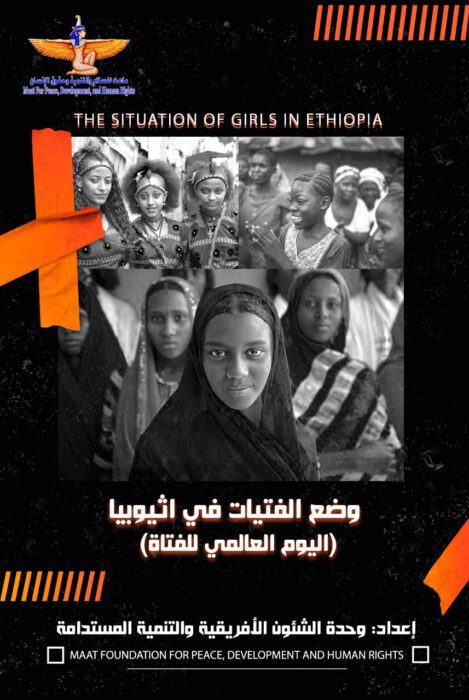Education, child marriage and female genital mutilation are the most prominent violations that girls face in Ethiopia
Moncef: Ethiopia's lag in development indicators has a grave impact on girls
In the context of the International Day of the Girl, the African Affairs and Sustainable Development Unit of the Maat Foundation for Peace, Development and Human Rights issues a research paper on the rights of Ethiopian girls to highlight their situation and the most prominent violations they are exposed to as a model for what girls are subjected to in the African continent.
The paper focused on four main axes that clarify what a girl is suffering in Ethiopia, namely: education and female circumcision in addition to reproductive and sexual health as a result of the rise in child marriage in Ethiopia.
Regarding education, the paper attributed the low enrollment of girls in post-secondary education to many factors, most notably the traditional gender norms and violence against female students. It also indicated, in particular, that special circumstances ignore the needs of girls with disabilities, which prevents them from completing their studies. As for female circumcision, the health survey indicated that 65% of girls and women in Ethiopia, between the ages of 15-49 years, have undergone the practice of circumcision. The paper also announced that 40% girls in Ethiopia marry before reaching the age of 18 and added details about the fragility and weakness of the health care system for women and girls and the consequent serious complications during pregnancy, during childbirth and beyond.
For her part, Hajer Moncef, Director of the African Affairs and Sustainable Development Unit, stated that the review of development indicators in Ethiopia has a grave impact on children and girls in particular, as political and economic instability on the one hand and not giving priority to implementing the 2030 Agenda on the other hand would affect all aspects of girls ’daily life. Of poverty, health, food, clean water and other basic rights, which was evident in some of the statistics included in the study.
It is worth noting that the continent of Africa comes within the interest of the Maat Foundation for Peace, Development and Human Rights, as it is a member of the General Assembly in the Economic, Social and Cultural Council of the African Union, as well as the North Africa region coordinator in the group of major non-governmental organizations in Africa affiliated to the United Nations Department of Economic and Social Affairs.
To view the report via the following link: https://maatpeace.org/?p=26792
shortlink: https://maatpeace.org/en/?p=26792












